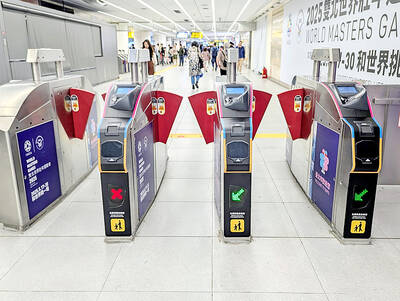Any referendum on nuclear waste disposal should be weighted for proximity, rather than follow strict county boundaries, environmental groups said yesterday, as they announced the results of nationwide consultation forums.
“Our hope is that we can truly start to have a national conversation about the future of nuclear waste. We cannot provide a definitive solution on disposal, because we do not have the resources of the government, and the government itself needs to fulfill its responsibilities, while respecting citizens’ views in the process,” Green Citizens’ Action Alliance secretary-general Tsuei Su-hsin (崔愫欣) said. “This is not a long-term problem, it is already singeing our eyebrows, because the first and second nuclear plants’ internal storage facilities have already reached capacity.”
She said the anti-nuclear movement had held a total of eight separate forums across the nation on the issue of waste disposal since the annual national March rally along Ketagalan Boulevard in Taipei, with roughly 120 participants from non-governmental organizations and local residents.
Forums discussed whether to send nuclear waste abroad for storage, the criteria and processes that should be used for selecting a new national nuclear waste disposal site, which government agency should be responsible and how affected local residents should participate in the process.
Citizen of the Earth Energy and Industry Division director Tsai Hui-sun (蔡卉荀) said that whether nuclear waste should be sent abroad was the greatest point of contention.
“Lots of people felt that we should handle the waste ourselves, because we created it and exporting would only lead to further oppression for disadvantaged groups abroad. However, there were also some people who felt that because of geological conditions, it was too difficult to deal with it domestically,” she said.
The final consensus document calls for low-level waste to be disposed of domestically, and for the government to provide for medium-term disposal of high-level waste.
Any site should be chosen based primarily on safety and environmental concerns, while relevant information should be made public and also translated into Aboriginal languages, the document said, which also called for revisions to current referendum regulations to increase the influence of local residents.
Taitung County’s anti-nuclear power and nuclear waste alliance secretary-general Kuo Ching-wen (郭靜雯) said that current referendum rules would be ineffective if applied to the case of Nantian (南田), a Paiwan village next to Pingtung County which has been proposed as a disposal site.
“Taitung is a long county, and under current rules all other county residents would be able to vote on site approval, but neighbors right across the border in Pingtung would not have any say,” she said.
The consensus document calls for local residents directly affected by waste disposal facilities to be granted a veto or extra “weighted” votes in a referendum that would see participants determined by proximity to facilities rather than along county lines.

A magnitude 6.4 earthquake struck off the coast of Hualien County in eastern Taiwan at 7pm yesterday, the Central Weather Administration (CWA) said. The epicenter of the temblor was at sea, about 69.9km south of Hualien County Hall, at a depth of 30.9km, it said. There were no immediate reports of damage resulting from the quake. The earthquake’s intensity, which gauges the actual effect of a temblor, was highest in Taitung County’s Changbin Township (長濱), where it measured 5 on Taiwan’s seven-tier intensity scale. The quake also measured an intensity of 4 in Hualien, Nantou, Chiayi, Yunlin, Changhua and Miaoli counties, as well as

Credit departments of farmers’ and fishers’ associations blocked a total of more than NT$180 million (US$6.01 million) from being lost to scams last year, National Police Agency (NPA) data showed. The Agricultural Finance Agency (AFA) said last week that staff of farmers’ and fishers’ associations’ credit departments are required to implement fraud prevention measures when they serve clients at the counter. They would ask clients about personal financial management activities whenever they suspect there might be a fraud situation, and would immediately report the incident to local authorities, which would send police officers to the site to help, it said. NPA data showed

ENERGY RESILIENCE: Although Alaska is open for investments, Taiwan is sourcing its gas from the Middle East, and the sea routes carry risks, Ho Cheng-hui said US government officials’ high-profile reception of a Taiwanese representative at the Alaska Sustainable Energy Conference indicated the emergence of an Indo-Pacific energy resilience alliance, an academic said. Presidential Office Secretary-General Pan Men-an (潘孟安) attended the conference in Alaska on Thursday last week at the invitation of the US government. Pan visited oil and gas facilities with senior US officials, including US Secretary of the Interior Doug Burgum, US Secretary of Energy Chris Wright, Alaska Governor Mike Dunleavy and US Senator Daniel Sullivan. Pan attending the conference on behalf of President William Lai (賴清德) shows a significant elevation in diplomatic representation,

The Taipei MRT is to begin accepting mobile payment services in the fall, Taipei Rapid Transit Corp said on Saturday. When the company finishes the installation of new payment units at ticketing gates in October, MRT passengers can use credit cards, Apple Pay, Google Pay and Samsung Pay, the operator said. In addition, the MRT would also provide QR payment codes — which would be compatible with Line Pay, Jkopay, iPass Money, PXPay Plus, EasyWallet, iCash Pay, Taiwan Pay and Taishin Pay — to access the railway system. Currently, passengers can access the Taipei MRT by buying a single-journey token or using EasyCard,